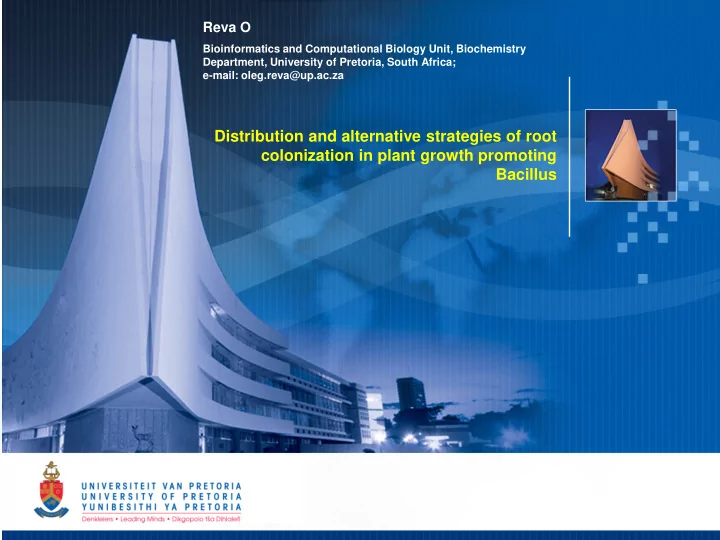

Reva O Bioinformatics and Computational Biology Unit, Biochemistry Department, University of Pretoria, South Africa; e-mail: oleg.reva@up.ac.za Distribution and alternative strategies of root colonization in plant growth promoting Bacillus 1
Motivation Application of beneficial microorganisms residing in the rhizosphere to promote plant growth is a promising and efficient method of biocontrol of plant pathogens. Till recently, the gene regulation in PGPR Bacillus during root colonization was studied only in a few bacteria, and it remains unclear to which extend other PGPR bacteria follow the same pattern of gene regulation. Introduction of new generation sequencing techniques (NGS) made it possible to investigate gene expression profiles under similar experimental conditions in multiple taxonomically related PGPR bacteria by using the RNA-Seq approach. In general, the gene expression profile in B. amyloliquefaciens FZB42 was quite different to that in B. atrophaeus UCMB-5137 with strong up-regulation of motility proteins and antibiotic biosynthesis. Colonization of barley roots by B. atrophaeus UCMB-5137 (A and B) and by B. amyloliquefaciens UCMB-5113 (C and D) . 2
Results B. atrophaeus UCMB-5137 was grown up on the liquid medium (1 C medium containing 0.1% glucose) with (experiment) and without (control) 0.25 mg/ml maize root exudate. Tiny amounts of root exudate caused a significant up and down regulation of many genes – predominantly stress response and biofilm formation. In general, the gene expression profile in B. amyloliquefaciens FZB42 was quite different to that in B. atrophaeus UCMB-5137 with strong up- regulation of motility proteins and antibiotic biosynthesis. Stress conditions Up-regulated Down-regulated Pirson correlation Root exudate Up-regulated Down-regulated Up-regulated Down-regulated Stationary growth 25 23 5 64 0.505 Growth at 51°C 11 24 0 26 0.404 Growth at 16°C 20 20 8 27 0.280 Growth with 1.2M NaCl 3 11 4 20 0.059 Involved transcription SigB CcpA, ??? ??? SigD factors 3
Results 0.25 0.2 0.15 Down-regulated Up-regulated 0.1 0.05 0 TF in 200 bp promoter regions of operons with the regulation opposite to stress conditions 4
Results: barcoding Complete genome comparison revealed a set of 150 rather conserved core genes, which have accumulated amino acid substitution with a relatively higher rate than other genes. It implied an evolutionary positive selection of amino acid substitutions leading to adaptation of organisms to specific habitat conditions . Sensitivity and specificity of barcodes were tested on metagenomic datasets from public databases. 5
Results: barcoding 6
Conclusion • PGPR activity in Bacillus is strain specific. Wheat seedlings experiment Shoots Roots Avr 0.105136 -0.03435 0.030393 Control 0.25867 0.407144 0.291039 B. amyloliquefaciens ssp. plantarum UCMB5007 0.182813 -0.04507 0.020595 B. amyloliquefaciens ssp. plantarum UCMB5014 0.214569 0.063894 0.114669 B. subtilis ssp. subtilis UCMB5121 0.238446 0.245324 0.236647 B. subtilis ssp. subtilis UCMB5021 0.149694 0.0014 0.055654 B. amyloliquefaciens ssp. plantarum UCMB5044 0.043479 0.075687 0.01919 B. amyloliquefaciens ssp. plantarum UCMB5140 0.214428 -0.12448 0.044977 B. mojavensis UCMB5075 0.149083 -0.06751 0.040788 B. amyloliquefaciens ssp. plantarum UCMB5113 0.364464 0.063448 0.208691 B. atrophaeus UCMB5137 0.077601 -0.18928 -0.05584 B. subtilis ssp. spizizenii At2 0.07758 -0.15868 -0.0272 B. subtilis ssp. subtilis At3 0.147346 0.064669 0.114312 B. amyloliquefaciens ssp. plantarum At1 • Strategy of plant colonization and eco-niche prevalence may differ significantly even between closely related PGPR micro-organisms. • NGS based RNA-seq is a powerful and affordable tool to investigate molecular mechanisms of plant colonization and gene regulation, including identification of expression of regulatory non-coding RNA. 7
Acknowledgement PhD student – Liberata Mwita; Programming and bioinformatics research was funded by a grant of the National Research Foundation of South Africa (#86941) and GRI support for sequencing. 8
Recommend
More recommend